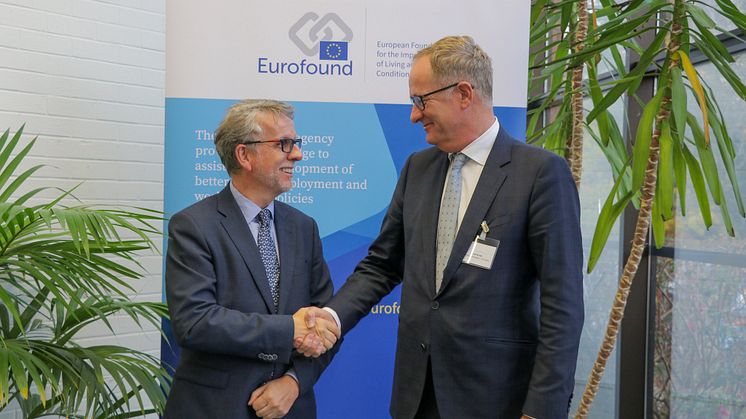Eurofound publishes updated, standardised minimum wage data for 2021
Eurofound has published updated monthly comparable data, converted to euro and standardised across 12 months, for 21 EU Member States and the United Kingdom for 2021

Eurofound has published updated monthly comparable data, converted to euro and standardised across 12 months, for 21 EU Member States and the United Kingdom for 2021

The employment toll of COVID-19 has been stark in Europe, and it could have been even greater had it not been for the adoption of unprecedented assistance measures in all Member States, supported by the European Union. But have these policies benefited different groups in the labour market equally, or have they cemented existing inequalities in access to support?

Nominal statutory minimum wages in most Member States and the UK continued to rise in 2021. With inflation being low, this has resulted in real increases for those minimum wage workers who have managed to retain their jobs and the same working hours.

The employment fallout of COVID-19 has been a story of two types of service work. Office-based knowledge workers have largely kept their jobs and incomes while working from home; whereas client-facing service workers have borne the brunt of the lockdowns and the steep declines in demand for in-person services in restaurants, hotels, leisure and the arts.

In the most successful businesses, managers were found to facilitate employees to work independently rather than to focus on controlling whether they carried out their tasks. Closely monitoring employee behaviour might indeed ensure that workers do their job but is unlikely to motivate them to go beyond their job description.

Standard employment is not simply being replaced by non-standard work; employment is becoming more diverse, and policy must accordingly become more tailored.

Stefan Gran has been elected Chair of Eurofound’s Management Board during the third meeting of the Board on 6 November 2020. He takes over from outgoing chair Aviana Bulgarelli, Ministry of Labour and Social Policies (Ministero del Lavoro, della Salute), Italy.

Eurofound’s new flagship report ‘Challenges and prospects in the EU: Industrial relations Developments 2015-2019’ provides an overview of developments in industrial relations and social dialogue in recent years, prior to the COVID-19 outbreak.

An ageing Europe and rising public expenditure on long-term care have signalled for some time that the fundamentals of care provision need to be addressed. However, the shocking death toll in care homes during the COVID-19 pandemic and the fact that many long-term care services were ill-equipped to protect their vulnerable users have lately focused the public mind on the issue.

At the end of his term as Executive Director on 30 November 2020, we engaged in a socially distant interview with Juan Menéndez-Valdés to review the last decade, his thoughts on Europe and his hopes for Eurofound.

The COVID-19 crisis has led to a doubling of restructuring job loss in the first half of 2020. The new European Restructuring Monitor ‘ERM report 2020: Restructuring across borders’ reviews recent restructuring activity in the EU, from January 2019 up to and including the first impacts of the COVID-19 crisis. It also presents an analysis of transnational restructuring cases.

The gender pay gap in gross hourly earnings in the EU was 14.8% in 2018. To help combat discriminatory pay practices by employers, the European Commission recommended in 2014 the introduction of pay transparency measures in all Member States. But more than half still have not implemented any such measures. Where do Member States currently stand on the agenda?

According to the recently published European Company Survey 2019 by EU agencies Eurofound and Cedefop, almost all managers (96%) agree training is important for employees to do their current job and most workplaces in the EU offer at least some training, yet only a small number – 9% – offer comprehensive training and learning opportunities to most of their employees.

The #EurofoundCompanySurvey ECS 2019 demonstrates that companies can design their workplace practices to help generate outcomes that benefit both workers and employers. Eurofound is organising a live #AskTheExpert webinar session on 29 October to delve into the European Company Survey 2019 findings relating to skills.

New data from Eurofound’s European Company Survey (ECS) show that two-thirds of workers (private sector, with more than 10 employees, EU27) are estimated to have their wages set via a collective wage agreement. Bargaining coverage is substantially higher in countries where there are sectoral agreements and where these are frequently extended to non-covered companies or workers.

Young people are overrepresented in the sectors hit hardest by COVID-19 restrictions, such as retail, travel and hospitality. According to Eurofound’s ‘Living, working and COVID-19’ survey of people in Europe, 11% of respondents aged 18–29 lost their jobs during the pandemic, compared to 8% of workers over 30.

Fewer than one-third (31%) of companies in the EU27 facilitated the regular direct participation of employees in organisational decision-making and accorded them a high degree of influence last year.

One in five companies in the EU-27 succeed in providing the optimal workplace environment, according to the new European Company Survey, This report is based on the fourth edition of the European Company Survey (ECS), which was carried out jointly by Eurofound and Cedefop in 2019.

Mental well-being among people in Europe improved between the April and July waves of Eurofound’s Living, working and COVID-19 surveys, with the largest increases among those aged 50 and over.

Approximately 40% of paid hours worked by employees were performed from home during the COVID-19 crisis, showing the magnitude of change that has taken place with regards to working life in just six months, and the now paramount importance of telework to Europe’s broader economy.
